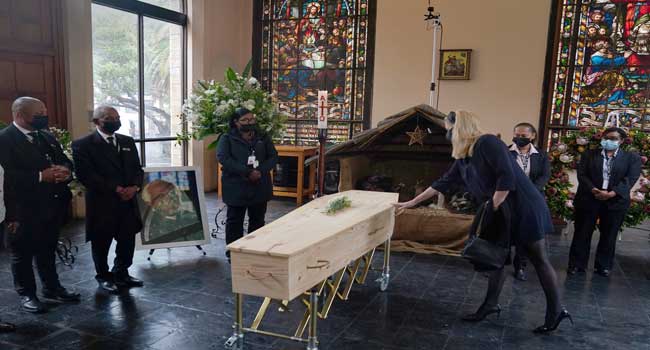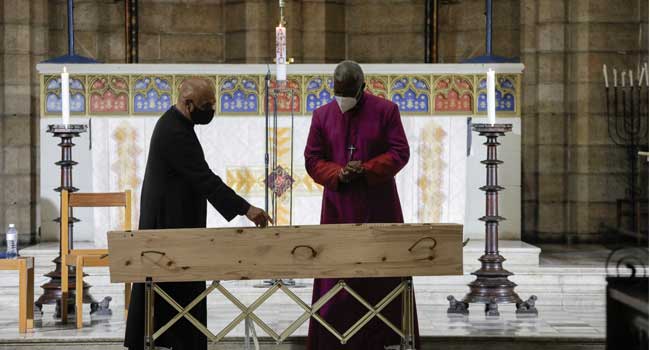
A few white plastic chairs in front of his house and umbrellas to shield the midday heat, neighbours in Soweto, South Africa’s bustling township where Desmond Tutu lived during apartheid, on Wednesday paid tribute to the fearless cleric.
Tutu died in Cape Town on Sunday aged 90.
“He used to tell me ‘go to school, you must fight for your rights knowing exactly what you are fighting for’,” recalls Linda Malinda, now 63.
She still resides in the same house she stayed in with her parents back then, in the 1970s, just a few meters from the anti-apartheid icon’s house in the township, a crucible of the struggle against a brutal minority regime.
In 1985, the world’s most famous clergyman was ordained as the first black Anglican bishop of Johannesburg.
Twenty years earlier, the school teacher walked out of the classroom to protest against the deteriorating standards of education for blacks and the introduction of racial segregation in schooling.
“They made sure to teach them just enough English for them to understand the orders they will be given,” Tutu said in 1995.
READ ALSO: Tutu’s Body Lies In State At South Africa Cathedral
On a southern hemisphere summer day, a few dozen people, some dressed in black-and-white church uniforms, converged for a religious ceremony in front of Tutu’s home, along the popular Vilakazi street.
A blue plaque on a wall of Tutu’s house reminds visitors that a “champion of human rights once lived here”.
A small podium and speakers are set up on the sloppy street, where two freedom struggle icons and Nobel laureates — Tutu and Nelson Mandela — once lived just a few dozen metres apart.
A sign points the way to the “Nobel Prize Walk”. Groups of tourists stop by.
– Boldness’ –
Some dropped a note in the condolence book placed on a table, pages being gently flipped by the wind: “Thank you for what you have done for humanity” and “Thank you for being the voice of the voiceless”.
Minutes before the start of the ceremony, senior church representatives arrive and quicky jump out of their chauffeured cars and hurriedly put on their robes, right there on the pavement.
Members of top ranking premier soccer league team Orlando Pirates, dressed in black tracksuits, were the first choir to deliver the opening rendition.
From the pulpit, Tutu denounced the violence police meted out against children during the deadly June 1976 Soweto riots.
Gradually, he became the voice of the “voiceless” jailed Mandela, living under constant threat from apartheid security forces.
“We would wake up in the morning to go to church. And each time we saw …the big soldiers cars, we knew he would be officiating,” said Mathabo Dlwathi, 47.
“We knew they wanted to kill him but for some strange reason they never got to do it,” she added
“There was just some holiness about him,” said reverend Xolani Dlwathi, a dean at the Johannesburg parish.
Different members of society, including the newly-minted mayor of Johannesburg Mpho Phalatse, also paid tribute to the venerated anti-apartheid campaigner.
“It is my prayer that we will have the boldness to confront our realities as the Archbishop did,” she said.
AFP




